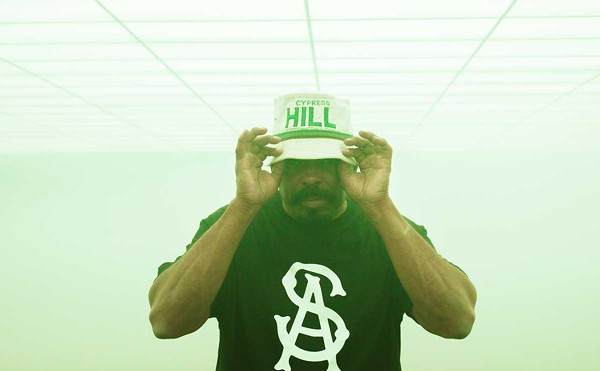This wasn’t the edict of the mid-’60s military dictatorship. The scarcity of rock came from musicians and listeners of MPB themselves, who policed the music to keep it untouched by colonial influence. At most, light rock stylings by artists such as Roberto and Erasmo Carlos gave Brazilian rock rebels their own yeh-yeh music, with songs like "É Proibido Fumar" ("No Smoking").
But one day in 1968, the brothers Arnaldo and Sérgio Dias Baptista and Rita Lee – the trio that is Os Mutantes – plugged in behind the songwriter Caetano Veloso. These rock revolutionaries, clad in plastic costumes, created a jarring atonality matched only by the uproar of the audience, which prevented the group from even finishing a song. The song that they couldn’t finish playing? "É Proibido Proibir" ("No Forbidding").
That was a key moment in the birth of Brazil’s vanguard Tropicália movement. The Tropicalistas devoured influences from abroad and within, creating innovative, flamboyant new Brazilian forms. To grasp what an affront to cultural sensibilities Os Mutantes and the other Tropicalistas posed in their native Brazil in the late 1960s, imagine John Lennon making his "more popular than Jesus" statement, Dylan going electric and Hendrix obliterating the National Anthem. Simultaneously. At the Super Bowl halftime show.
In the music of Os Mutantes, anything goes. Baroque woodwinds clash with the sounds of musique concrète. Gladiatorial marches lead to giddy orchestral pop. Excursions down Tin Pan Alley run into reconstructions of rural Brazilian song forms, complete with a bellowing berimbau. Rita Lee contributes sophisticated, jet-set pop vocals, and of course there’s wild rock ’n’ roll. All of these records feature a dizzying, funhouse-variety show atmosphere that’s unpredictable and captivating. Though the sound is obviously Lennon and McCartney-damaged, this wasn’t the mere wearing of some Beatle-boot style. This was the creation of an avant-garde, psychedelic pop bricolage that would’ve made Beck jealous, had he even been born back then.
Jarring guitar dissonance blankets these recordings. And it’s not mere electric guitar: It’s fuzzed out, obnoxiously howling electric guitar. Os Mutantes got a hand from arranger Rogério Duprat, too. Duprat was a modern classical and experimental electronic music composer from São Paulo. His mastery of arrangement, as well as his embrace of the avant-garde, lend an intriguing depth to these records.
Os Mutantes (1968) kicks off with the Veloso/Gilberto Gil-penned "Panis et Circenses," or "Bread and Circuses." The song is a psych-pop masterpiece, whose lyrics ever so carefully survey the cultural (in)attitudes of the time. (Unfortunately, most cultural references in the lyrics get lost in the poor translations from the Portuguese provided with these reissues.) All three records also utilize plenty of outside material, ranging from satirical renditions of popular tunes to reinterpretations of songs by Françoise Hardy and the Mamas and the Papas.
A more aggressive rock sound surfaces on the 1970 album – the title of which translates to The Divine Comedy, Or I’m Kind of Spaced Out. Still, Os Mutantes’ anarchic spirit conducts a Spike Jones-style assassination of a Brazilian romantic standard, and they perform a ridiculously over-the-top Janis Joplin parody called "My Refrigerator Doesn’t Work." And the ersatz God-rock of "Haleluia," a sort of blessing to ward off the government censors, echoes the pomp of "You Can’t Always Get What You Want." Os Mutantes reduces the highest praise to a moronic rock mantra – a preposterous, offensive high point.
Supposedly these psychedelic masterpieces were made before Os Mutantes ever turned on chemically. The drugs would come later, as would the failed relationships, the cursed instruments, the mental freakouts, the descent into heavy, loud prog rock, and the solo careers. But, as the man once said, that’s the rest of the story. The reissue of Os Mutantes’ first three records is a significant sonic excavation, on par with the unearthing of the Monks and the Silver Apples, if not more so. Like the work of those visionary groups, these records simply must be heard to be believed. Greg Baise gets electric in the Metro Times. E-mail [email protected]





